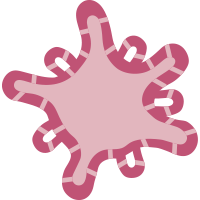
Organoid News
Organoid News is an online resource dedicated to the latest research about and featuring organoids.
Matrix Directs Trophoblast Differentiation in a Bioprinted Organoid Model of Early Placental Development
[Nature Communications] Scientists presented a bioprinted placental organoid model generated using the first-trimester trophoblast cell line, ACH-3P, and a synthetic polyethylene glycol matrix.
PU.1 Restores Microglial Dysfunction Caused by C9ORF72 Repeat Expansions in Neural Organoids
[Brain] To further study microglia in C9-ALS/FTD in the context of a complex 3D disease environment, researchers developed cerebral organoids that innately develop microglia derived from induced pluripotent stem cells of C9-ALS/FTD patients and controls.
Self-Organized Vascularized Hepatic Organoids in Microcapsules for Liver Regeneration
[Research] The authors proposed a novel system of self-organized vascularized hepatic organoids encapsulated in hydrogel microcapsules with biomimetic features for liver regeneration.
Accelerated Maturation of Branched Organoids Confined in Collagen Droplets
[Lab on a chip] This analysis of organoid morphology and transcriptomic data suggests an accelerated maturation of organoids cultured in collagen droplets, highlighting a shift in developmental timing compared to traditional systems.
Co-Infection of Helicobacter pylori with Epstein-Barr Virus in Gastric Organoids Enhances Cell Proliferation and Morphogenesis
[Journal of Virology] Researchers developed patient-derived normal gastric organoids and used high-accuracy microinjection to introduce Epstein-Barr virus and H. pylori.
MERS-CoV and SARS-CoV-2 Infection in Diverse Human Lung Organoid-Derived Cultures
[Journal of Virology] Investigators generated primary lung organoids from human donor cells and used them to derive monolayers and air-liquid interface cultures with the goal of comparing the replication kinetics of two circulating highly pathogenic coronaviruses, SARS-CoV-2 and MERS-CoV.
Multi-drug pharmacotyping improves therapy prediction in pancreatic cancer organoids
[Cancer Cell International] Scientists established 13 patient-derived organoids and performed both single-agent and multi-drug testing. They compared different clustering approaches of drug-response metrics and established a new classification approach based on pharmacokinetic modeling.
Human Cerebral Organoids Model Tumor Initiation and Infiltration in an Autologous Astrocyte-Supported Setting
[iScience] Investigators established a reproducible cerebral organoid model of brain tumorigenesis in an autologous setting by overexpressing c-MYC, a common oncogene in brain tumors. GFP+/c-MYChigh cells were isolated from tumor organoids and used in two different approaches.
Personalized Medicine in Cystic Fibrosis: Characterization of Eight Rare CFTR Variants in Intestinal Organoids and Cellular Models
[Molecular Diagnosis & Therapy] The authors highlighted the importance of using patient-derived intestinal organoids as a theranostic tool to predict the clinical benefit and thus increase the number of people with cystic fibrosis with access to the currently approved CFTR modulator therapies.
Hydrogel Design for Intestinal Organoids: Principles Governing Translational Regenerative Medicine
[Biomaterials Science] Scientists provide a comprehensive evaluation of intestinal organoid (IO) culture systems and discuss how mechanobiological signaling dynamics at the cell–matrix interface can guide the rational engineering of biomimetic extracellular matrix to standardize and regulate IO culture phenotypes.
Organoids: Physiologically Relevant ex vivo Models for Viral Disease Research
[Journal of Virology] Investigators discuss the diverse applications of organoid models in virology, including infection modeling, host-virus interaction studies, CRISPR/Cas9-based gene editing, antiviral drug screening, and vaccine development.
Lung Organoids As a Human System for Mycobacteria Infection Modeling and Drug Testing
[FEBS Journal] The authors describe how human lung organoid technology provides new tools to better understand host–Mycobacteria interactions in the airways and test new therapeutic targets.
Organoids are three-dimensional cell cultures that more accurately model cell behavior, organ function, and pathology than traditional two-dimensional cell culture. Organoid News was launched in 2020 to help scientists stay up-to-date with this revolutionary new research system. Use Organoid News to stay current with the latest applications and discoveries using organoids, as well as new reviews, jobs, news, and upcoming events.

 Cancer Stem Cell News
Cancer Stem Cell News Cell Therapy News
Cell Therapy News Dermal Cell News
Dermal Cell News Endothelial Cell News
Endothelial Cell News ESC & iPSC News
ESC & iPSC News Extracellular Matrix News
Extracellular Matrix News Hematopoiesis News
Hematopoiesis News Hepatic Cell News
Hepatic Cell News Human Immunology News
Human Immunology News Immune Regulation News
Immune Regulation News
 Intestinal Cell News
Intestinal Cell News Mammary Cell News
Mammary Cell News Mesenchymal Cell News
Mesenchymal Cell News Muscle Cell News
Muscle Cell News Neural Cell News
Neural Cell News Organoid News
Organoid News Pancreatic Cell News
Pancreatic Cell News Prostate Cell News
Prostate Cell News Pulmonary Cell News
Pulmonary Cell News
